Discover Books of Titans Podcast
Books of Titans Podcast

Books of Titans Podcast
Author: Erik Rostad
Subscribed: 635Played: 27,979Subscribe
Share
© Erik Rostad
Description
Welcome to the Books of Titans Podcast where I (Erik Rostad) seek truth & beauty in the Immortal Books. My goal is to read the Great Books written by 200 authors over the next 15 years and share what I’m learning. I’ll talk a bit about each book, tie ideas together from a variety of genres, and share the one thing I always hope to remember from each of the Immortal Books.
www.booksoftitans.com
www.booksoftitans.com
324 Episodes
Reverse
I started reading through the complete dialogues of Plato this year. I came to a point where I realized that Plato was referencing philosophers who came before him and I didn’t know anything about them or their ideas. I took a break from Plato to consider these philosophers who gave the seeds to Plato’s philosophy.These philosophers are called the Presocratics and the Sophists. They are Pre-Socrates in that their ideas precede Socrates, not necessarily that they preceded him historically. The Presocratic philosophers discussed in this podcast episode lived between 600 - 400BC. Socrates lived between 469 - 399BC.I read The First Philosophers with a translation and introduction by Robin Waterfield. In the introduction, Waterfield says “Presocratic thought was holistic : it was an attempt to give a systematic account of the whole known universe and all its major features.” They cover ideas such as the soul, happiness, and the makeup of things. You can see not only their intellectual method but also their ideas in the dialogues of Plato.In this episode, I cover four of my favorite Presocratic philosophers (Heraclitus, Parmenides, Pythagoras, and Empedocles) and some of their ideas. I also share the one thing that stuck out to me the most about these fathers of philosophy. This is a public episode. If you'd like to discuss this with other subscribers or get access to bonus episodes, visit www.booksoftitans.com/subscribe
An introduction to this reading project for anyone new to Books of Titans. I started this in 2017 as an attempt to read more books and experiment with ways to help me remember what I read. It’s morphed into a lifelong reading project that I now expect to last until I die as I slowly make my way through The Immortal Books. Give this episode a listen to learn more and then give my wife Stephanie’s music a listen as well! This is a public episode. If you'd like to discuss this with other subscribers or get access to bonus episodes, visit www.booksoftitans.com/subscribe
“The safest general characterization of the European philosophical tradition is that it consists of a series of footnotes to Plato.”~ Alfred North WhiteheadI’ve been enjoying my Plato Project where I’ve decided to read through the Complete Works of Plato. I’ve read 9 dialogues so far and realized I needed to take a step back and learn more about the philosopher himself. This was the perfect book for that endeavor.Robin Waterfield covers the basic known facts about the life of Plato, his friendships, his practical application of philosophy, especially with the king of Syracuse, and the Academy he started in Athens. It is a fascinating look at how Plato’s life fed into his philosophy.In this episode, I cover the main things I learned about Plato and share the One Thing that stuck out the most.Enjoy! This is a public episode. If you'd like to discuss this with other subscribers or get access to bonus episodes, visit www.booksoftitans.com/subscribe
I’m making the wild assumption that you like books. Perhaps that’s because you like what’s inside of books - the stories, ideas, information, history. But do you ever just stop and think about the book itself? The physical book that you hold in your hand?Joel J Miller has a book coming out this Tuesday, November 18th, 2025 called The Idea Machine: How Books Built Our World and Shape Our Future. It’s a book about the book. It’s a richly researched account of the history of the book through the ages, how Christians played a large role in its eventual format, and how the organization and categorization of ancient and moderns libraries led to the A.I. tools of today.I read an advance copy of the book a few months back and absolutely loved it. It gave me a new appreciation for book, the perfect idea transfer technology. In this podcast episode, I share some of my favorite ideas from the book and tie in some things Joel spoke about during a book event I attended on Thursday evening, November 13th.If you live in the Nashville area, Joel will be at Landmark Booksellers on the book’s release date of Tuesday, November 18th at 6pm. Jeff Goins will conduct the interview.You can also order a signed copy of the book from Landmark Booksellers. I think you’ll enjoy it. This is a public episode. If you'd like to discuss this with other subscribers or get access to bonus episodes, visit www.booksoftitans.com/subscribe
The goal of this dialogue is to define the Sophist. We’ve seen the Sophist pop up in Greek Tragedy and Comedy and it’s never a pretty picture. They are often contrasted with the Philosopher, the true lover of wisdom, and are denigrated as those who have the appearance of wisdom. They are known for charging money to teach their students how to argue a point, irrespective of its truth.In attempting to define the Sophist, Plato must overcome a snag put forward by the philosopher Parmenides. Parmenides has stated that false statements are impossible:“This should not ever prevail in your thought: that the things that are not, are; rather do you keep your mind well shut off from just this way of searching.”Basically, don’t think or talk about things that have no being; things that don’t exist. However, if that is the case, there is nothing false and everything a person says is true. Everything is relative.In order to define the Sophist, Plato must show that something that is not, is. He does this by saying that the false is something other than or different from the true. Plato’s Forms must be true. Do things that are false also have Forms? No, they are simply other than or different from Forms.Therefore, the Sophist is one who makes false imitations of true things. He is not a philosopher.This dialogue hurt by brain. I read it three times using different translations in an attempt to struggle through it and try and understand it. I share what I learned in this episode and I hope the work makes it so that you see the dialogue in a fresh way. As always, if I’ve gotten anything incorrect, please help me learn by commenting below.Show Notes:Book Versions I Read:* Plato Complete Works - edited by John M. Cooper - translated by Nicholas P. White* Plato: Collected Dialogues - edited by Edith Hamilton & Huntington Cairns - translated by F.M. Cornford* Plato Sophist: The Professor of Wisdom by Eva Brann, Peter Kalkavage, Eric SalemThe Division Thicket (from the introduction in Plato Sophist: The Professor of Wisdom): This is a public episode. If you'd like to discuss this with other subscribers or get access to bonus episodes, visit www.booksoftitans.com/subscribe
The goal of this dialogue is the definition of a statesman. Can Plato show us the essence or nature of the statesman? This dialogue is a sequel to Sophist. In each dialogue, an attempt at a definition is sought through the method of division. For example, Statesman begins with Knowledge, which is divided into practical and theoretical knowledge. The statesman would be on the theoretical side.This division occurs until the discussion partners Visitor from Elea and Socrates the Younger describe the statesman as a shepherd or herder of humans. That doesn’t work, and so a Deus Ex Machina of sorts jumps in through the telling of a myth. In the myth, the ages of Cronus and Zeus are contrasted and the dialog is set on a different path. That path leads to a definition or essence of the statesman as more of a weaver of disparate parts.The dialogue then gets into different types of governments and the role of law within each set. It posits the best form of government (rule by statesman through special, expert knowledge) but admits that such a person is unlikely. The next best thing is the rule by imitator (Sophist?) who rules by the existing set of laws, despite the likelihood of injustice.I loved this dialogue. The surprise appearance of the myth was so delightful and the discussion about law, types of government, courage, and governance utterly fascinating. In this episode, In this episode, I give an overview of the arguments and take a look at the myth and it’s relation to the definition of the statesman.Show Notes:* Want to discuss White Nights by Fyodor Dostoevsky? Simply become a paid subscriber here on the Books of Titans Substack and you’ll receive details about our November 12th Zoom call to discuss this short novel. This is a public episode. If you'd like to discuss this with other subscribers or get access to bonus episodes, visit www.booksoftitans.com/subscribe
I finished reading Man’s Search for Meaning as the fireworks announced the start of 2018. I was closing out my first year of this reading project with my final book of the year and was trying to finish it before the clock struck 12. I didn’t make it, but I was close.That book ended up being my favorite for many years. Here was a man claiming that it was possible to develop a spiritual life amidst hell on earth. Amidst hunger, torture, unbearable loss, and despair. There was a flicker of hope.Last week, I led a reading group through Man’s Search for Meaning. It was my first time re-reading it since late 2017. It was startling to see how I’ve changed in that time, both personally and in my reading life. I mark up my books and use different color pens on re-reads, so it was clear what stuck out the first time and what stuck out these 8 years later.I’ve also read a number of books I hadn’t read before my first Frankl reading. Those books have impacted me, have deepened my convictions, and have perhaps provided another angle on Frankl. One of those books, The Gulag Archipelago by Aleksandr Solzhenitsyn, was life-altering. I read that one late 2019. In re-reading Man’s Search for Meaning, I see a number of similarities between these two books.In this podcast episode, I share some things that stuck out to 2025 Erik that didn’t stick out as much to 2017 Erik. I also share some important similarities between Man’s Search for Meaning and The Gulag Archipelago.If you’d like to listen to the original podcast episode after the 2017 reading of the book, you can do so here: This is a public episode. If you'd like to discuss this with other subscribers or get access to bonus episodes, visit www.booksoftitans.com/subscribe
How do we know what we know? That’s the question Socrates presents to Theaetetus in this dialogue by Plato. I was actually intrigued with the some of the side discussions about learning and memory and how that connects to knowledge. In this podcast episode, I share the general outline of the arguments and highlight the parts about memory that might help us in our reading lives. This is a public episode. If you'd like to discuss this with other subscribers or get access to bonus episodes, visit www.booksoftitans.com/subscribe
So far, this is my favorite dialogue by Plato. I’ve only read 5 of them, so I have a ways to go, but this one covers the origin of language and the correctness of names. It answers this question - is there a reason behind the name of a thing or is it just by chance?Cratylus believes there is a correct name for each thing, one that belongs to it by nature. Hermogenes believes that names are agreed upon by the community. Socrates leads the discussion to determine if “names are given in accord with nature.”I found this dialogue so interesting and delightful because Socrates spends most of the time guessing at the origin of words of gods, concepts, and names.In this episode, I share some of my favorite word descriptions and ideas from Cratylus. This is a public episode. If you'd like to discuss this with other subscribers or get access to bonus episodes, visit www.booksoftitans.com/subscribe
Were you there?It’s the opening question of this dialogue. Echecrates is asking Phaedo if he was there when Socrates drank the hemlock and died in prison. He was there. This is Phaedo’s account of the final day of Socrates.I wonder what I would do knowing I had a few hours to live. Would I be frantic? Would I conduct a dialogue about the soul as Socrates does here? Would I calmly drink my death sentence that 500 of my peers had bestowed upon me? I doubt it. Socrates was calm. He died as he had lived.There are some incredible parts to this dialogue. With a few hours left to go, we find Socrates “versifying” the Fables of Aesop. He’s setting prose to poetry. He’s not creating anew. He’s improvising on what already exists. It’s an incredible thing to consider. Socrates didn’t leave any writings, but he did apparently leave some poetry.The bulk of this work considers a questions that would be on the forefront of anyone’s mind about to exit this world. What’s next? Socrates argues that we have a soul that will continue into an afterlife. In fact, he argues that that soul pre-existed embodiment and that our learning was simply a recollection of Forms or Ideas encountered in that state. Socrates was being completely rational then in his calm willingness to die. This was simply a continuation of how he had lived his life, a betterment of the eternal part of him. His life as a philosopher was preparation for death.In this episode, I cover the main arguments, talk about three things that stuck out to me, ask 6 questions that I hope to get answered in other Plato dialogues, and close out with the One Thing I always hope to remember from Phaedo by Plato.Book Versions Read or Consulted:* Plato Complete Works - edited by John M. Cooper - translated by G.M.A. Grube* Phaedo - translated by David Gallop - Oxford World’s Classics* The Last Days of Socrates - translated by Hugh Tredennick and Harold Tarrant (intro) - Penguin Classics (just read the intro in this one) This is a public episode. If you'd like to discuss this with other subscribers or get access to bonus episodes, visit www.booksoftitans.com/subscribe
Socrates is nearing the end. He’s been sentenced to death and the time has come where he will be forced to drink hemlock. Crito, his old friend, comes to persuade him to escape this death. He tries to convince Socrates that in this grave injustice, the just thing would be to escape.But Socrates says “we must examine whether we should act in this way or not, as not only now but at all times.” Would it be right for Socrates to escape?This short dialogue allows us see if Socrates will remain true to what he has preached throughout his life.Show Notes:Book Versions:* Plato Complete Works - edited by John M. Cooper - translated by G.M.A. Grube* The Last Days of Socrates - translated by Hugh Tredennick and Harold Tarrant (intro) - Penguin Classics* Defense of Socrates, Euthyphro, and Crito - translated by David Gallop - Oxford World’s Classics This is a public episode. If you'd like to discuss this with other subscribers or get access to bonus episodes, visit www.booksoftitans.com/subscribe
Here’s Part II of a conversation with author Allen Levi that took place on Saturday, September 6th in Franklin, Tennessee, at the historic Franklin Theatre. Part I released last week and is the discussion from the 3pm event. Part II releases this week and is the discussion from the 7pm event. Each event was sold out and questions were different for each event.Allen Levi is the author of Theo of Golden. In this conversation, I asked him about this book, his inspirations, his life, and potential movie adaptations. Enjoy! This is a public episode. If you'd like to discuss this with other subscribers or get access to bonus episodes, visit www.booksoftitans.com/subscribe
SPOILER ALERT: This conversation contains book spoilers. Listener beware.Here’s Part I of a conversation with author Allen Levi that took place on Saturday, September 6th in Franklin, Tennessee, at the historic Franklin Theatre. Part I releases this week and is the discussion from the 3pm event. Part II releases next week and will be the discussion from the 7pm event. Each event was sold out and questions were different for each event.Please Note: Static interference is present at various points throughout the interview. I've worked to minimize it, but it is still audible at points.Allen Levi is the author of Theo of Golden. In this conversation, I asked him about this book, his inspirations, his life, and potential movie adaptations. Enjoy! This is a public episode. If you'd like to discuss this with other subscribers or get access to bonus episodes, visit www.booksoftitans.com/subscribe
Last week, Socrates was on his way to his trial in the Euthyphro dialogue. In Apology, Socrates is giving his defense against three charges:* Not recognizing the gods recognized by the State* Manufacturing new gods* Corrupting the youthIf you are expecting any contrition on the part of Socrates, you’ve come to the wrong place. Here, apology means a defense speech in a legal proceeding, and Socrates is anything but apologetic in the sorrowful sense. Here we see a defiant man unconcerned with death but rather in continuing on in a life of justice and piety despite the threat to his life.It’s quite startling actually. The defiance of Socrates in the face of 501 of his peers. But it’s also quite disturbing that a society that produced such great works of art around this exact time (399BC) could also kill one of its best citizens. Can civilization handle this level of truth telling?In this episode, I consider Socrates’ defense to the three charges, look at Aristophanes’ Clouds and another account of the trial, Xenophon’s Apology.Show Notes:Book Versions:* Plato Complete Works - edited by John M. Cooper - translated by G.M.A. Grube* The Last Days of Socrates - translated by Hugh Tredennick and Harold Tarrant (intro) - Penguin Classics* Xenophon Apology - translated by Martin Hammond - Oxford World’s Classics* Xenophon Socrates’ Defense - translated by Hugh Tredennick and Robin Waterfield, with an excellent intro by Waterfield - Penguin Classics This is a public episode. If you'd like to discuss this with other subscribers or get access to bonus episodes, visit www.booksoftitans.com/subscribe
I have decided to read through the complete works of Plato. Euthyphro is my first dialogue in this Plato Project. I ended up reading it 4 times within 4 different translations. In this episode, I give a brief overview of the dialogue, talk about piety and if/when this word shows up in Homer, the Greek Tragedies, and elsewhere, and cover each of the answers and responses between Euthyphro and Socrates.Socrates has asked Euthyphro if piety and impiety take on an essential form. Poor Euthyphro thinks he is wise by giving particular example after particular example, but Socrates is after something deeper. Will we get to a form of piety and impiety that can be referenced in all circumstances? The stakes are high. Socrates has just been charged with impiety in corrupting the youth, creating new gods, and forsaking the old gods. If he can’t answer this charge, he’s in trouble. He’s hoping Euthyphro can give him a piety form. Or is Socrates just prodding Euthyphro to see if he knows what he is taking about?Here are the four versions I read:* Complete Works - edited by John M. Cooper - translated by G.M.A. Grube* Penguin Classics The Last Days of Socrates - translated by Hugh Tredennick and Harold Tarrant (intro)* Loeb Classical Library - translated by Harold North Fowler* Collected Dialogues - edited by Edith Hamilton & Huntington Cairns - translated by Lane Cooper This is a public episode. If you'd like to discuss this with other subscribers or get access to bonus episodes, visit www.booksoftitans.com/subscribe
Do you find yourself struggling to remember what you read? This has been a continual difficulty for me and is a main reason that I started this reading project. I wanted to read more books, but more importantly, I wanted to experiment with different ways to help me remember what I read.One of the most powerful ways I’ve found to remember what I read is to apply basic summary frameworks during and after the completion of each book. In this article, I’ll highlight the most powerful frameworks that you can write in the back of the book, in a journal, or in your notes app upon completing a book.The best part about these ideas is that they take a short time to complete but can greatly enhance your reading memory and comprehension.The One SentenceLast week, I had breakfast with my friend DT Slouffman. He’s a contender for the most interesting man alive and one of his roles is teaching the art of storytelling at a college. In that course, he writes the following sentence on the board as a tool for students to apply to fiction:________ wants ________ but ________ so ________ .What I love about this simple sentence is that it requires you to identify the protagonist, his or her desire, the challenge, and the path towards growth, resolution, or fulfillment. Going backwards, it identifies the change required to overcome an obstacle by the main character. It’s an encapsulation of the hero’s journey and it forces you to consolidate the book down to one sentence. If you can then remember this one sentence that you crafted, chances are you’ll be able to recall a large portion of the book.Here’s a One Sentence example I made from The Great Gatsby (yours may be quite different):Jay Gatsby wants Daisy but she is married so chaos and death ensue.I purposefully kept this one simple and short. I could elaborate on each fill-in part and you might choose to do so. The lack of a joyful resolution immediately identifies the work as a tragedy. By highlighting death, I immediately think of those situations in the book. I can picture Daisy and Jay as I did while reading the book. For properly recalling a book, sometimes you just need a simple hook that calls up other memories. This One Sentence framework is that hook.The One ThingA major focal point of this reading project is to attempt to remember just One Thing from each book that I read. It’s counterintuitive and may even sound wasteful, but I found that if I tried to remember many things from a book, I would forget them all, but if I just remembered One Thing, I could usually recall it, and it would in turn unlock other parts of the book.This idea is easier to impose upon works of non-fiction, but I’ll provide ideas for fiction as well. Here are a few ways to remember One Thing in different types of books:* For self-help books, instead of trying to remember One Thing, simply implement One Thing, immediately. If you are reading a book about personal finance, implement one idea from the book in relation to debt, budgets, or investments. If it’s a book about fasting, begin fasting. Running, apply one of the tips on your next run. You will always remember that book if you implement one idea into your daily routine.* For biographies and works of history, try to remember one story from the book. For example, in Walter Isaacson’s biography of Einstein, there was a story about Einstein being invited to a women’s prayer group in the USA during WWII. They prayed together in a circle and when it came to Einstein, he took out his violin and prayed through his instrument without saying a word. Oh, to have been a fly on the wall. That story helps me recall why Einstein was in the USA at that point, what he was working on, and other aspects of his story.* For works of fiction, write out the One Thing you can’t get out of your brain. Maybe it’s a theme you see across a variety of books. Perhaps the protagonist confronts a problem you’ve had in the past and your One Thing is how that person dealt with their situation.In general, you want to highlight the One Thing that stood out to you the most about that book. If you can remember that, it will help you to remember other parts of the book as well.Identifying StakesThis is another tool that my friend DT teaches his children and students. The idea here is that most books will present things of value or desire that are put at risk. That creates a stake and that stake must be paid by the end of the book. The exercise here is to create a two column list in the back of the book, in your journal, or in a notes app and write the stake on the left and its resolution on the right. If a stake is introduced and not resolved, you have a sub-par book (or movie, or tv show, etc.).Here are a few stakes from The Great Gatsby:* Jay Gatsby builds a mansion across the lake from Daisy in an effort to impress her with his wealth. That can’t just remain neutral, either it will have an impact or not. The stake must be paid in one way or another.* Jay tells Daisy’s husband Tom that she never loved him. That creates a stake that must be paid in one way or another by Daisy’s response.* Daisy’s husband’s mistress is killed by Daisy and Gatsby in a car accident. That creates a stake that must be paid through the legal system or through personal revenge.By highlighting these stakes and payments, you are generating your own framework for the book and are actively seeing each stake through to its conclusion. This will help you to remember key occurrences in the book. This tool can be applied to nearly all fiction and many works of non-fiction, including biographies and histories.What are some tools you apply to the art of reading that help you remember what you read? This is a public episode. If you'd like to discuss this with other subscribers or get access to bonus episodes, visit www.booksoftitans.com/subscribe
I’m currently making my way through The Immortal Books by 200 different authors. I expect the project to take 15 years. I’m currently in year 3 and Plato is author 18 out of 200. I had initially planned to read 9 of his works (Apology, The Republic, Laches, Symposium, Philebus, Crito, Phaedo, Theatetus, Meno), but when people on Twitter suggested I pick up this version of his complete works, I began to consider reading Plato’s entire corpus.Why not? Plato has an outsize influence on what comes after him. His ideas are ingrained in our heads. We see some things through his eyes. I’m largely approaching Plato blindly. I read The Republic in 2017 and remember next to nothing. I’ve avoided philosophy out of a deep fear of not understanding it. I’d like to change that. I’d like to dig into Plato, get to know his writings, ponder his ideas, and explore his works.I recorded this podcast episode as a time stamp of sorts. I want to see if there is something that happens to a person after they read Plato. Will there be a “before Plato Erik” and an “after Plato Erik?” We’ll see. I hope you follow along on this journey. I plan to cover most of Plato’s works on this podcast over the coming weeks and months. And I’ll see if I can finish this large tome by the end of 2025. This is a public episode. If you'd like to discuss this with other subscribers or get access to bonus episodes, visit www.booksoftitans.com/subscribe
A life well-lived. Looking back, what would make you say that about your own life? What would constitute that well-lived life? Would it contain grand gestures seen by many or small, sacred acts seen by few?The Last Sweet Mile is a long letter written by Allen Levi to his family that covers the last year of his brother Gary’s life. They had a special relationship. A relationship we all long for. They were remarkably close. Gary was diagnosed with brain cancer in 2011 and died an exact year later on July 22, 2012. Allen called that year with his brother the best year of his life.Allen wrote this book before his latest novel, Theo of Golden. I have Theo on my mind, and so I naturally compared the two books despite Theo being a work of fiction and The Last Sweet Mile a work of non-fiction. I see a lot of Gary in the character of Theo. The sacredness of small things. The signposts of beauty. Sadness. Joy. Laughter.When I finished reading Theo of Golden last December, I had a one word response–Stunning. I had that same one-word response after finishing The Last Sweet Mile. It’s heart-wrenching, it’s sad, but it’s beautiful, for it portrays a life well-lived. This is a public episode. If you'd like to discuss this with other subscribers or get access to bonus episodes, visit www.booksoftitans.com/subscribe
This episode is for anyone who wants to tackle the Great Books independently—whether you’re years out of college or just looking for a self-guided approach. Not sure where to begin? In this episode, I share ideas on how to prepare, start, and continue on your very own Great Books journey. This is a public episode. If you'd like to discuss this with other subscribers or get access to bonus episodes, visit www.booksoftitans.com/subscribe
I book the author events at Landmark Booksellers in Franklin, TN, and earlier this year, I saw that Dr. Mendelsohn was coming out with a brand new translation of The Odyssey for the University of Chicago Press. I reached out to Dr. Mendelsohn to see if he would be near Franklin any time soon, and to my delight, he was able to do an author event.It was fascinating. I learned so much about The Odyssey and about his translation choices. It shed new light on the epic. You can watch the event here and here are some of my main takeaways.The book I cover in this podcast episode is one that Dr. Mendelsohn wrote 8 years earlier in 2017. It’s account of an Odyssey cruise he had taken with his father, Jay Mendelsohn. His father decided to audit his son’s seminar course about The Odyssey and after that course, they took this cruise that stopped at all of the major locations in Homer’s epic.The book is a fascinating look at Homer’s Odyssey, a relationship between a father and a son, and a dive into major themes through out the epic. I learned a ton. I share some of those things in this podcast episode.I really enjoyed this book. It was not just an intellectual endeavor, it was a journey of the heart. The book is beautifully written and the format allowed for deep literary analysis, heartwarming father/son dynamics, and wonderful insight into the intangibles that make a marriage last forever. This is a public episode. If you'd like to discuss this with other subscribers or get access to bonus episodes, visit www.booksoftitans.com/subscribe


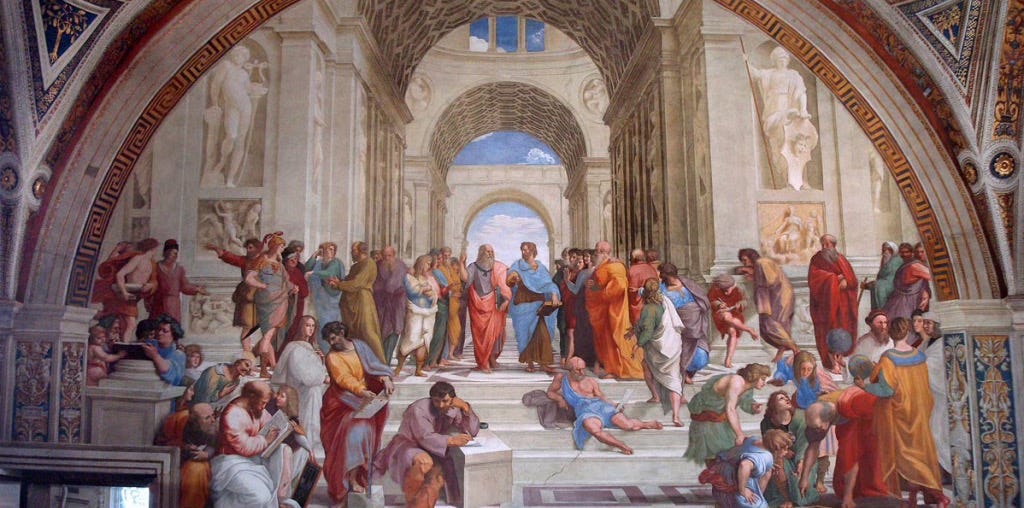
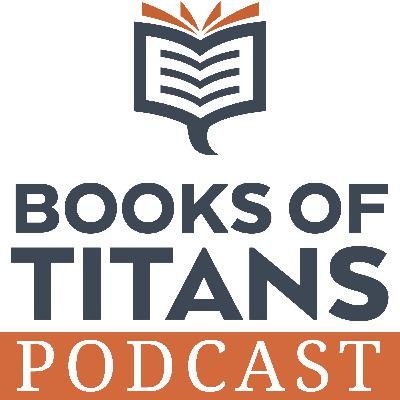
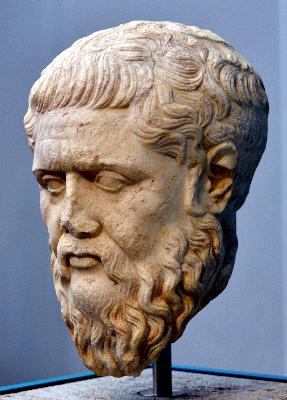
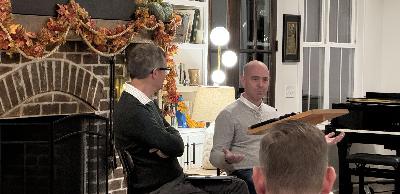

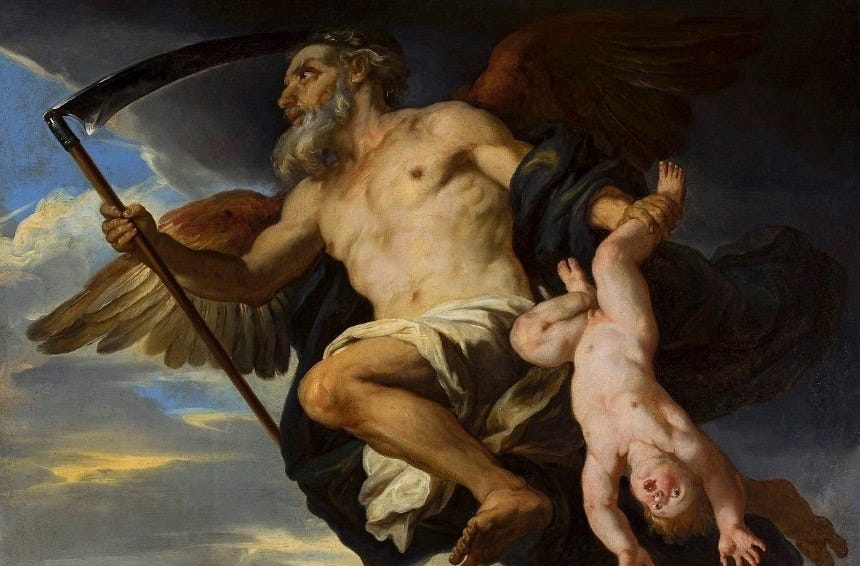
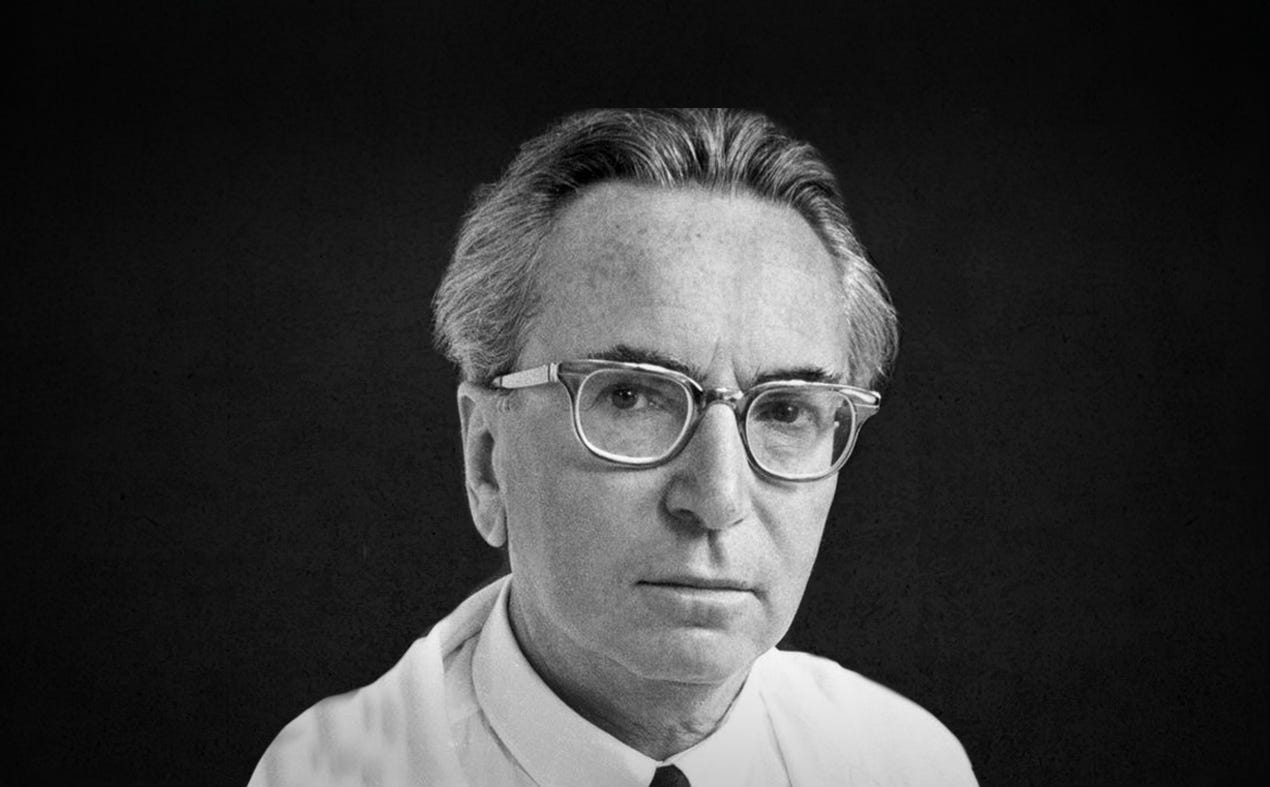
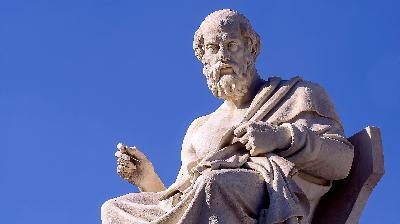
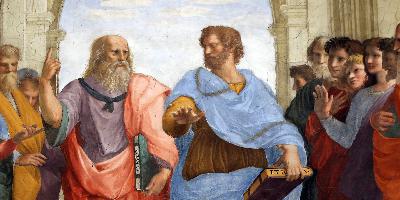
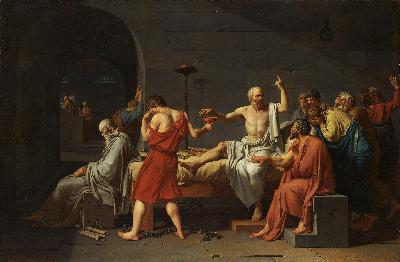
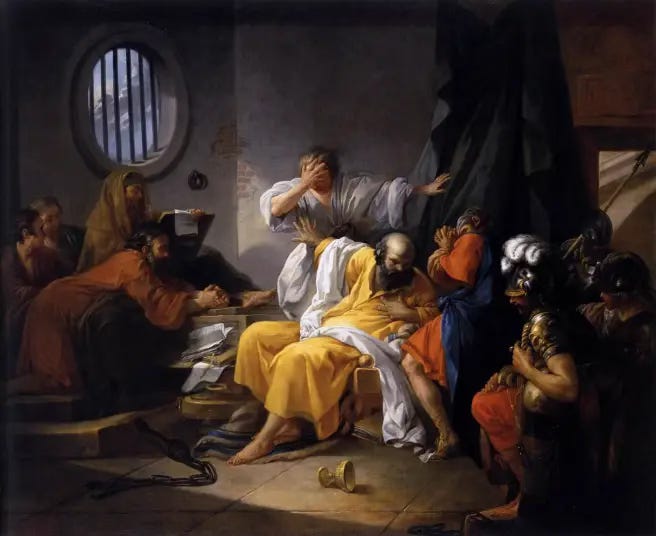
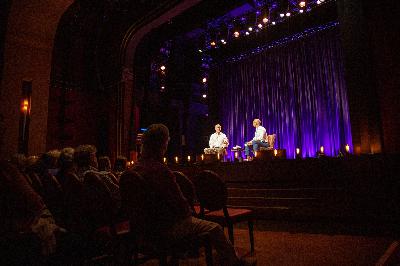

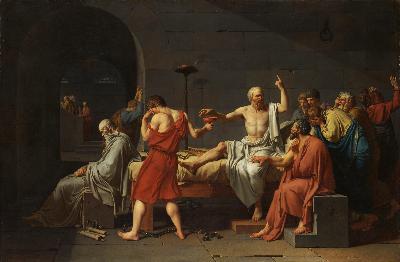



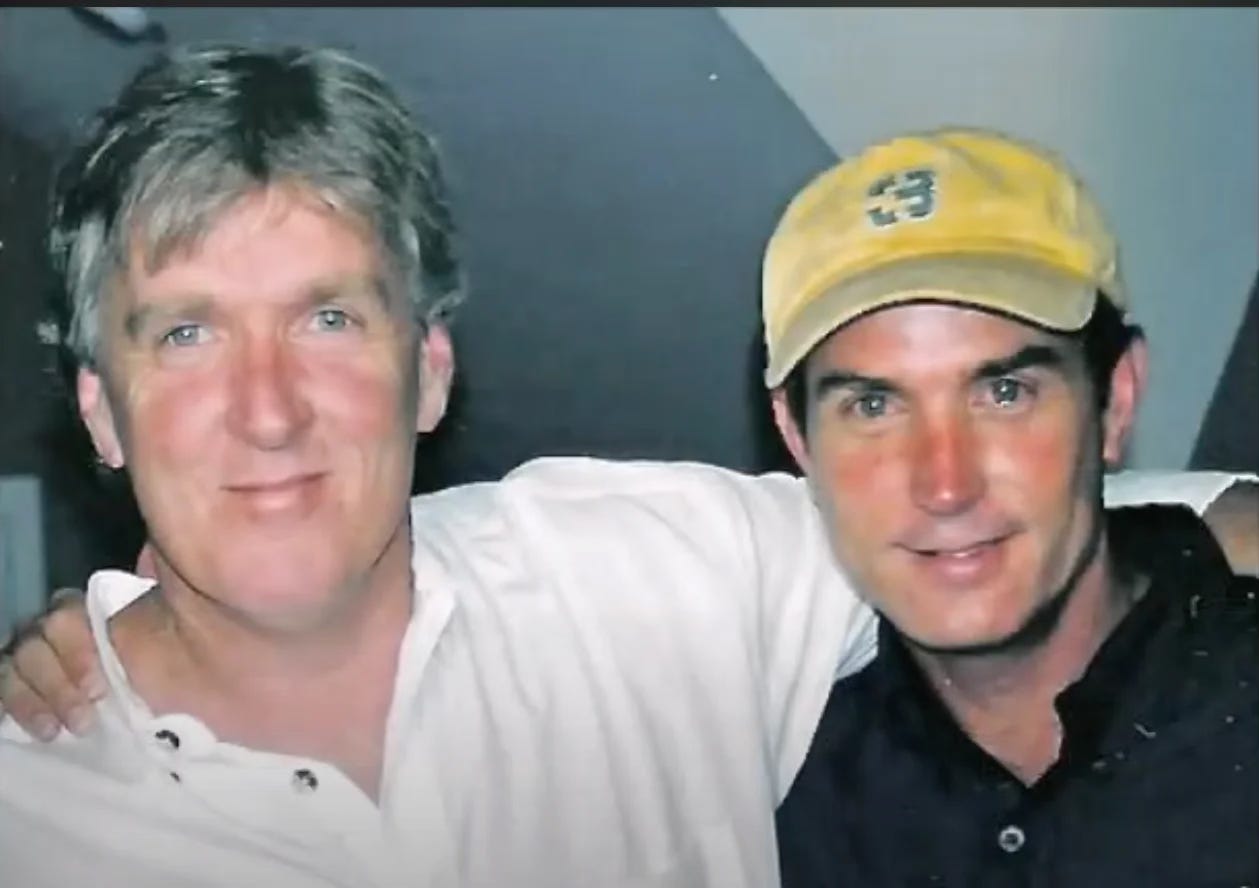
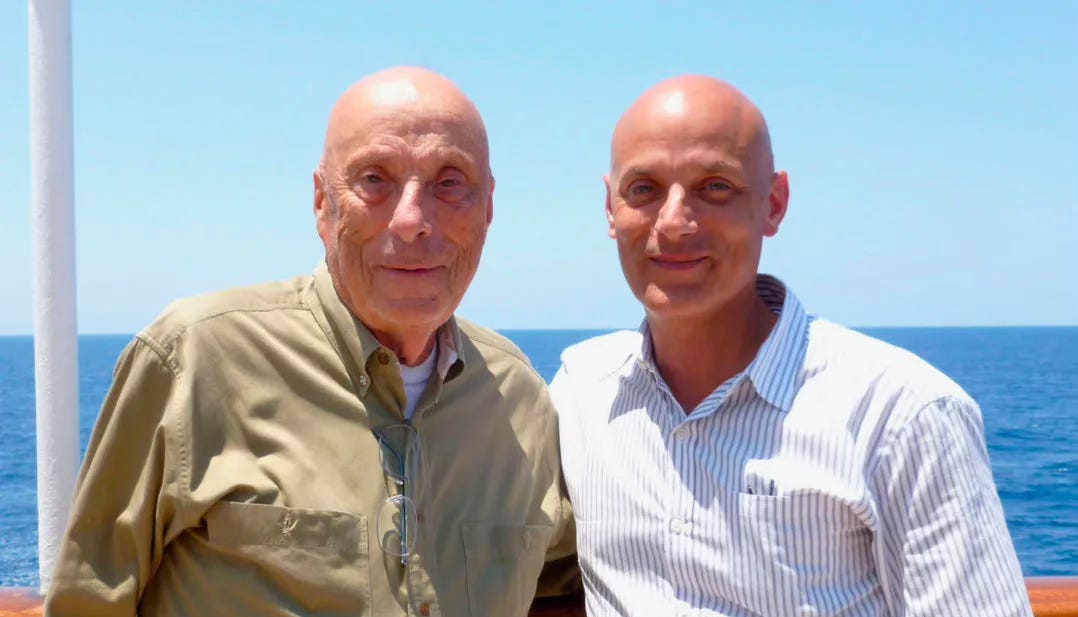



With all the respect I wanted to express my feelings and opinion about how you are presenting the books. You are to much emphasizing on your own views and opinions about the books rather than talking more about the books contents and let the listeners to judge a little themselves. Also you guys are not talking smoothly, to many interruptions in talking and cutting each other. I gave up listing to you guys. Thank you
Thanks for sharing!
Thanks for sharing!!
I'm not sure how you can dislike something because of nihilistic content? Pulp fiction is a terrible reference point as well. I mean if you don't agree with nihilism then you could at least put forth an alternative. what meaning is there to be attached to a wholesale massacre? I'm sure the concentration camps were sort of a factory of nihilism, in the survivors. And whichever one of you is "careful" about what you put in your head, you shouldn't be reviewing books. reality is harsh. Ignoring it doesn't make it all go away.